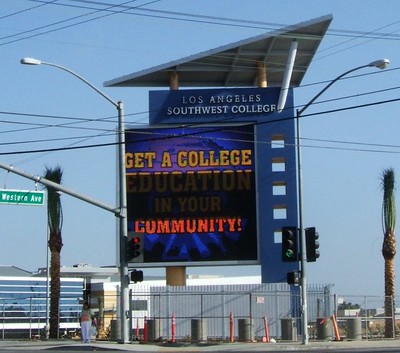Voters in the Los Angeles area will decide whether to authorize more than $5B in bonds for the Los Angeles Community College District. The measure, which will appear on the November ballot, seeks funding to refurbish the district’s campus facilities.
If adopted, most homeowners in the district would pay between $90 and $160 in taxes to fund the measure. According to the district’s Board of Trustees, many of the LACCD’s buildings were built before 1970. Most college buildings have an average life expectancy of about 60 years. Many LACCD buildings are approaching the end of their utility. In addition, updating the buildings would reduce their operational costs, improve their usefulness, and better meet the needs of programmatic changes at the colleges.
According to the LACCD, since 2000, district voters have approved nearly $10B in bond authorizations for the district. Preliminary inquiries show that the measure could get as much as 60% support from the voters. The measure needs at least 55% approval to take effect.
Besides modernizing campus buildings, the measure would also fund housing options for students and staff; technology upgrades for classrooms; wireless Internet infrastructure on campus; and sewer repairs and replacement.
Despite the eye-popping amount, the measure is going to pass. With most homeowners ponying up $100-$150 per year, the measure makes consummate sense. The money will be spread out among LACCD’s nine campuses. The district currently serves about 230,000 students.
Investing in community college
This bond request is on a grand scale, for sure, but that makes it easier to see why passing this request to the voters makes so much sense. Distributing the tax burden to the homeowners and businesses in the district makes a large sum of money very manageable. If LACCD approached this the Washtenaw Way, that would require each of the district’s students to come up with $925 per year for the next 25 years.
That approach takes the position that since the students benefit from the College, they’re the ones who should pay for it. Some of the WCC Trustees have actually voiced that opinion.
If we (in the community) accept that, we’re saying that the community derives no benefit from the community college at all. However, if that position is a little too coarse, and there is some community benefit to be had from WCC after all, having the students pay for everything renders them ill-gotten gains. The community simply enjoys the benefit of someone else’s contributions. And those contributions come from the poorest members of the community.
Unfortunately, we have Trustees on the Board who espouse this position. They truly believe that the taxpayers should reap the benefit of someone else’s investment, while making no investment themselves. They do not recognize that the community college contributes to their property values – which they hold in high regard. It is less a cost than it is an investment that will likely return itself 2-3 times over.
We don’t need short-sighted Trustees on the WCC Board anymore. We need people who are more concerned with governance and oversight and less concerned with guarding their own personal tax bills.
Photo Credit: waltarrrrr , via Flickr


























